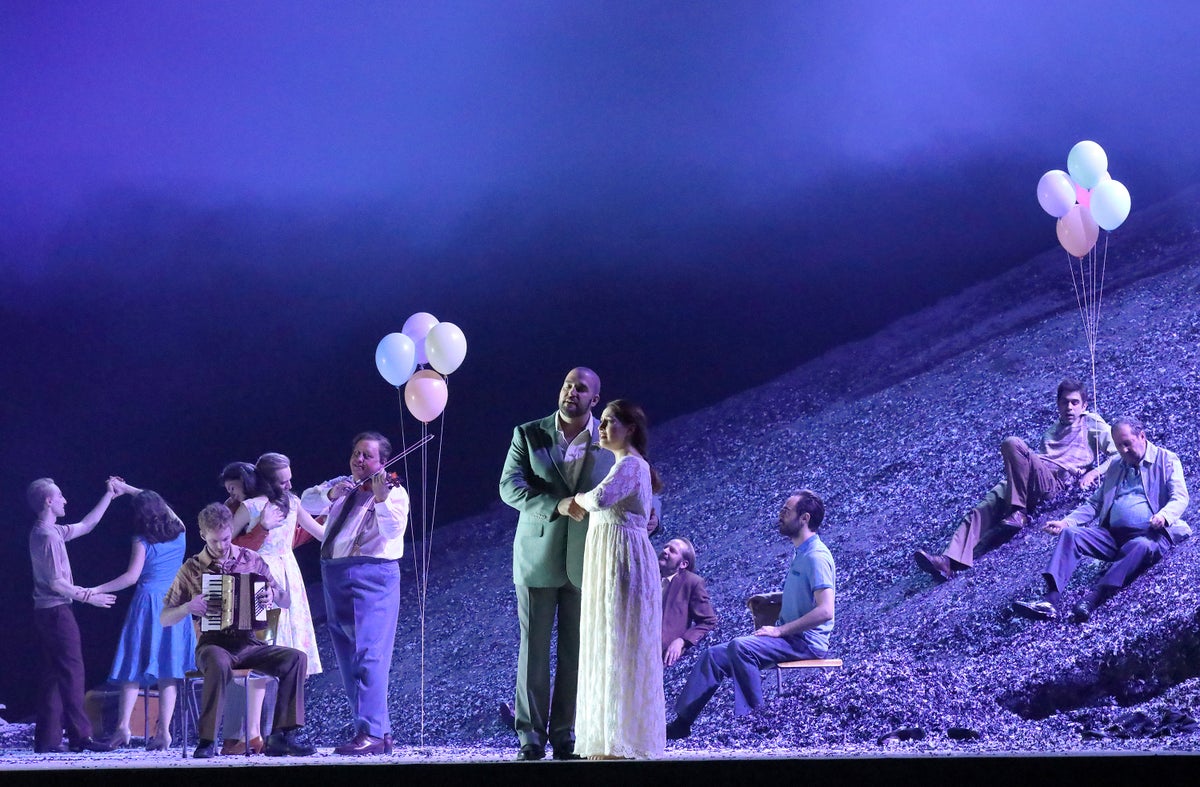
The opera world is split in two: European regietheater productions reinvent works in ways composers never imagined, while traditional stagings favored in the U.S. and parts of Italy are condemned by some cognoscenti as passé.
Martin Kušej’s vision of Mozart’s “Le Nozze di Figaro” at the Salzburg Festival includes cocaine-fueled fights, a predator priest, a nearly naked hooker and a basement garage rave.
Damiano Michieletto transforms Verdi’s “Aida” at Munich’s Bavarian State Opera into an antiwar jeremiad in which Radamès collapses from PTSD during a Triumphal March of amputees and the High Priest Ramfis attempts to marry the King’s daughter Amneris.
Tobias Kratzer’s staging of Wagner’s “Tannhäuser,” revived at this year’s Bayreuth Festival, envisions a clown-clad title character as part of a counterculture clique with a drag queen, dwarf and love goddess in a sequined cocktail dress who runs over a cop with a Citroën van in a Burger King parking lot.
“I’m very well known for my irritating work, and I think I was hired especially for that,” Kušej said. “Who wants to have the 150th version of a well-made `Figaro’ in Salzburg? I want it to be relevant for today’s audience. I saw many, many, many shows and I was always a bit disappointed. There are good shows. There are interesting shows. But my aim is really to make opera living in our times, questioning questions that we have today.”
Some directors engage in a can-you-top-this race of reinterpretation filled with tangential cultural allusions. Several arias were met with muted applause as puzzled viewers digested the stage action.
Krzysztof Warlikowski’s absurdist version of Verdi’s “Macbeth” in Salzburg has Lady Macbeth visit an obstetrician and discover she is infertile as sunglass-adorned witches prognosticate while wearing yellow-and-black armbands warning of radioactivity. Malgorzata Szczęśniak, the director's wife, is the set and costume designer and shifts location from Scotland to a Jeu de paume, a tennis court referencing the French Revolution.
Clips of Pier Paolo Pasolini’s “Il vangelo secondo Matteo (The Gospel According to St. Matthew)” and “Edipo re (Oedipus Rex)” are shown in the background. The banquet ends when a baby doll is served on a silver platter of parsley and apples. Macbeth is wheelchair-bound for the final act after a witch injures his leg by plunging knitting needles into a voodoo doll. Lady Macduff poisons more than three dozen children with spiked drinks at a movie theater and their lifeless bodies are arrayed across the front of the stage.
“You share this vision with your audience and from that moment starts the adventure,” Warlikowski said. “If you are coming with eyes to see just what happens, you will not get anything. But if you come with eyes who want to see and at the same time you are thinking, maybe your thinking is going to connect you to this vision.”
He was pleased by the lack of audience anger.
“In the case of Verdi, it’s not very easy not to be booed,” Warlikowski said.
Kušej looks at the gun-toting Almavivas and their servants as a mob family in a W-like hotel designed by Raimund Orfeo Voigt, in sharp contemporary costumes by Alan Hranitelj. The Count and Figaro snort during the overture, the Countess pops pills while swigging from a wine bottle, Susanna sips a cocktail along with a capsule and Basilio shoots up. Basilio is a priest instead of a music teacher and the gardener Antonio is homeless.
A staggered Figaro and a nodding Susanna begin the evening drunk in a bar, his “Cinque ... dieci ... venti” referring to shots rather than floor measurements. In Bartolo’s “La vendetta" aria, “tutta Siviglia” becomes “tutta la terra” to make it more universal. The Count. Figaro and Basilio rough up Cherubino during “Non più andrai (No more will you)” — the priest smashes Cherubino's face into a glass panel.
“Porgi, amor (Grant love)” opens the second act with the Countess staring at Gustave Courbet’s 1866 painting “L’Origine du monde” while a naked woman sits in the adjacent bathtub. The Count sings “Vedrò, mentr’io sospiro (I will see, while I sigh)” while a prostitute wearing only panties dresses him, earning a wad of cash. The household assembles, many wearing headphones, to dance in a parking lot seven levels below ground ahead of the Susanna-Figaro rooftop wedding.
Kusej said Met general manager Peter Gelb had thought about co-producing a “Forza del Destino” that appeared in Munich in 2013, but Gelb decided not to go forward after seeing it would contain 9/11 references.
After attending Kušej’s “Nozze” last week, Gelb said: “We’re interested in stage directors who would like to thrill our audiences, not revolt them.”
Booing directors has become standard at Bayreuth, but the dissenters were only a small segment for Jay Scheib’s “Parsifal” this year, dominated by AR glasses and a theme of global energy collapse. Kratzer, who said in his “Tannhäuser” program notes that “historical costume per se is now largely perceived as retro or reactionary,” was greeted with boos on opening night four years ago but his staging, with sets and costumes by Rainer Sellmaier, now is considered a Bayreuth classic. Claus Guth’s Paris Opéra “La Bohème,” set on a spaceship, was booed in 2017 and cheered when revived this year.
Cecilia Bartoli, the Italian mezzo-soprano who heads the Salzburg Whitsun Festival, picked Christof Loy for a minimalist staging of Gluck’s “Orfeo ed Eurydice” she is starring in this month.
“If we decide to make an opera of Bellini, of Rossini, of Mozart, of Haydn, of Gluck, of Verdi, we do have a music which was composed by the greatest composer and we have a libretto, which in some cases is very good,” she said. “A good director is one who respects, who understand this and is able to bring a new dimension of the piece. But one thing is to bring a new dimension, the other thing is to destroy the piece.”







